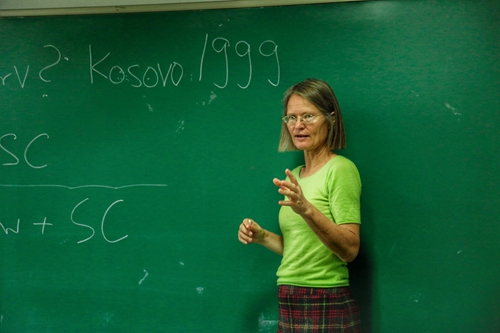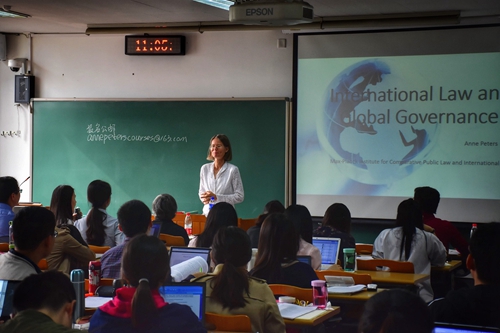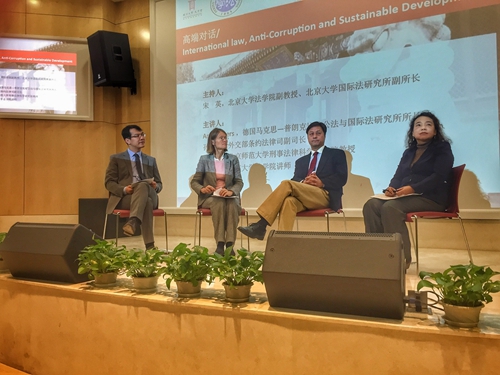Peking University, Oct. 15, 2016: Anne Peters, prestigious international jurist and director of Max Planck Institute for Comparative Public Law and International Law (MPIL), visited Peking University from October 15th to October 31st. Professor Peters offered a lecture series on the topic of “International Law and Global Governance” at Classroom Building No. 3 (Lau Hing Building), as part of the Peking University Global Fellowship.
In her series lectures, Peters took on a brand new perspective to dilate upon the historical development of international law as well as the potential challenges and risks it might confront in the future. During her first lecture. Peters reaffirmed the momentous structural changes and new research approaches of the international law. She also pointed out that international law should be understood as an empowerment discourse aiming to advocate rights of the poor and to enable justice to act on its own accord.

Peters delivering a lecture
In the second lecture, Peters cited the issue of Syria and Libya as an example to illustratethe limitations under the principle of territorial sovereignty, which was derived from the practical usage of Responsibility to Protect (R2P). Given the great changes that have taken place in the international community, Peters advocated that more attention should be given to non-State actors, multinational enterprises and other private actors in particular, to confirm whether they have the obligation to protect human rights.
Later in her fourth lecture, Peters first reviewed the history of international organization. And with focus on one of its legal barriers to domestic remedies, Peters explained why international organization enjoyed the rights of immunity. Peters also delved into the rationality and limits of immunity issues through a true story in the European Court of Human Rights.

Peters giving a lecture on constitutionalism
In the final lecture, Peters argued the core principles of constitutionalism including the rule of law and not of men, decentralization, freedom, humanrights, democracy and social welfare. She stressed that the rule of law is a common value and principle of national and international law. Therefore, International organizations as well as the United Nation Security Council, ought to respect it and strengthen the accountability regime when taking actions.

The dialogue named “International Law: Anti-Corruption and Sustainable Development”
Apart from the lecture series, she also participated in the elite dialogue named “International Law: Anti-Corruption and Sustainable Development” at the Underground Hall of No. 2 Gymnasium. During the seminar, Peters contended to identify corruption as aviolation of international human rights. In the interactive process, students had a heated discussion with the speakers.
Professor Peters, with broad horizon and profound academic accomplishments, shared her insights into the international law and global governance. It was beyond doubt that her efforts would advance the internationalization of teaching and research in international law at Peking University, meanwhile, bring a brand new vision for students to better understand international law and global governance.
Written by: Wu Mingying
Edited by: Wang Qian


